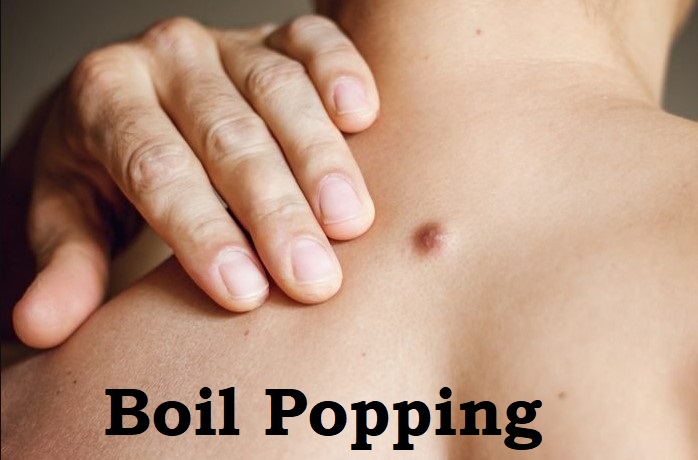Boil Popping: Assuming that you foster a boil, you might be enticed to pop it or spear it (open with a sharp instrument) at home. Try not to do this. It might spread contamination and exacerbate the boil.
Your boil might contain microscopic organisms that could be harmful if not treated appropriately. If your boil is excruciating or isn’t healing, have it checked by your PCP. The boil might have to be precisely opened and channeled so that anti-toxins can be prescribed.

Table of Contents
What is a Boil?
Boils bring about by an aggravation of a hair follicle or sweat gland. Commonly, the bacterium Staphylococcus aureus causes this irritation.
A boil typically appears as a hard growth under the skin. It then, at that point, forms into a firm, inflatable structure under the skin as it tops off with discharge. A boil regularly shows up in a cleft or where sweat and oil can develop, for example,
- underarms
- midriff region
- rump
- under bosoms
- crotch region
A boil generally has a white or yellow focus, which is caused by the fluid inside it. The boil might spread to other parts of the skin. A group of boils associated with one another under the skin is known as a carbuncle.
Why People Shouldn’t Pop a Boil Themselves at Home?
An individual should never attempt to remove the center of a boil at home. Pressing or blasting a boil causes a painful injury to the skin. This permits microbes from the boil to enter the bloodstream. Once inside the circulatory system, microscopic organisms can spread to different parts of the body.
Crushing or blasting a boil increases the risk of scarring. A portion of the microorganisms in boils might spread to others.
In general, a reduction will disappear on its own within a half month. During this time, an individual can use home remedies, including warm packs, to help with reducing pain and swelling.
How do Doctors Pop the Center of a Boil?
Clinical experts, like specialists and dermatologists, are the main experts who can safely remove the center of a boil.
Eliminating the center of a boil is a short-term procedure that requires a nearby sedative. When the boil and encompassing region are numb, the specialist will cut a small entry point in the boil. The cut permits a portion of the discharge to empty.
A specialist may then embed cloth into the cut to remove any excess discharge.
An individual can recover on the day of the procedure. A specialist might prescribe effective or oral anti-toxins to help prevent them from spreading.
Ways to Focus on a Boil at Home
The following home consideration choices might assist with mitigating boil side effects or keep the contamination from spreading to other parts of your body or others:
- taking ibuprofen to assist with decreasing pain and increasing mobility
- holding a warm, wet pack against the boil for 10-15 minutes three to multiple times every day until the discharge begins to deplete
- keeping the boil and its encompassing region clean
- trying not to touch the boil
- keeping a burst boil covered
- wash hands and the area of the boil well
Recuperating Time
The amount of time it takes to heal depends on a number of factors, like how serious, severe, or profound it is. Boils usually explode and deplete on their own within 1-3 weeks, according to the AAD. Some experts say that many boils heal in 10 days or less.
When to See a Specialist?
The AAD recommends that an individual should also consider a specialist as soon as possible if:
- the aggravation or expansion deteriorates
- more boils or eye cysts show up
- they may cause a fever or vision issues
Individuals should also see a specialist if they are in danger of difficulties. This includes individuals who have a boil on the face, who have repeating boils, or who have hidden conditions that debilitate the immune system.
FAQs
Within half a month, your boil will begin to heal all on its own. Your boil might heal without the discharge emptying, and your body will gradually assimilate and separate the discharge. Your boil doesn’t go away and either remains the same size or becomes even larger and more painful.
Boils can be treated effectively with zinc, which helps provide invulnerability. Alongside zinc, food sources containing vitamin A (fish and dairy items), L-ascorbic acid (products of the soil), and vitamin E (nuts and seeds) are useful in supporting the resistant framework.
After a while, it will feel like a water-filled bubble. Torment deteriorates as it is filled up with discharge and dead tissue. Torment reduces when the boil channels. A boil might deplete all by itself.
Boils are brought about by microorganisms, most commonly by Staphylococcus aureus microscopic organisms (a bacterial illness). Many individuals have these microbes on their skin or – for example – in the coating of their noses, without them creating any issues.
Boils close to the vagina bring about by microorganisms that enter through the skin and contaminate a hair follicle. Keeping your genital region clean and maintaining proper hygiene is the most effective way to prevent repeating boils. Assuming you shave your pubic region with a razor, change your razor frequently.
Summary
Bacterial disease in the skin causes boils. Popping a boil might acquaint microorganisms with more profound layers of the skin or the circulation system. This could lead to significantly more serious contamination.
A specialist can remove a boil and recommend germ-free balms or anti-infection agents if necessary. Individuals can treat an overflow at home by keeping the area clean, applying warm packs, and taking an OTC pain medication.
Someone with serious, frequent, or repeating boils ought to see a specialist. It is also critical to see a specialist if a boil doesn’t heal or shows side effects of bacterial contamination.
